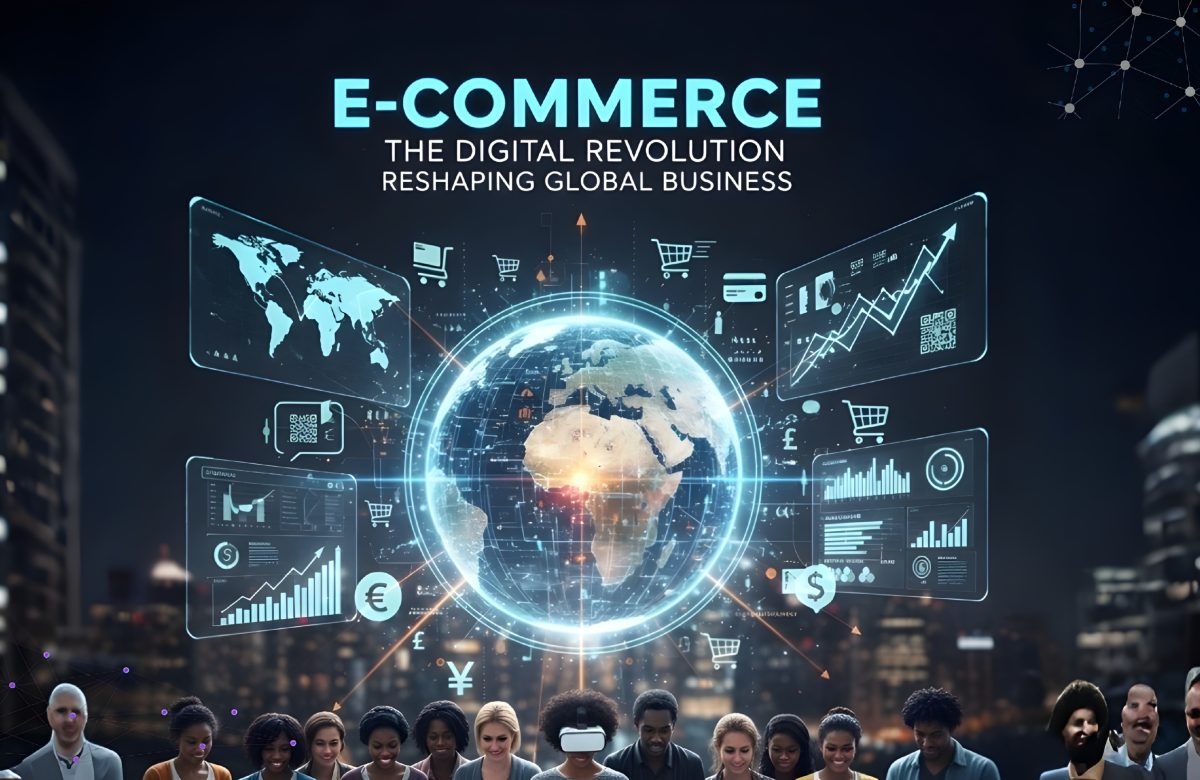Introduction
E-commerce, or electronic commerce, has become one of the most transformative innovations of the 21st century. It refers to the buying and selling of goods and services using the internet, as well as the transfer of money and data to execute these transactions. From small businesses showcasing their products online to multinational corporations running digital-first operations, e-commerce has created opportunities and challenges that have redefined global business.
Today, nearly every industry—from fashion and electronics to groceries and digital services—leverages e-commerce to reach a wider customer base. With global e-commerce sales expected to surpass $6.3 trillion in 2024, the sector continues to expand, shaping consumer behavior, supply chains, and the very structure of economies.
The Growth and Scope of E-Commerce
1. Rapid Global Expansion
The rise of the internet and mobile technology has fueled the rapid growth of e-commerce. According to recent reports, more than 2.6 billion people worldwide shop online, and this number keeps growing. Markets such as Asia-Pacific, North America, and Europe dominate, but developing regions like Africa and South America are catching up fast.
2. Convenience and Accessibility
The biggest driver of e-commerce is convenience. Customers can browse and purchase products 24/7 without geographical limitations. Payment gateways, digital wallets, and one-click checkouts have further streamlined the buying process.
3. Diverse Business Models
E-commerce isn’t just about selling products online. It includes:
-
B2C (Business-to-Consumer): The most common model, where businesses sell directly to customers (e.g., Amazon, eBay).
-
B2B (Business-to-Business): Companies selling to other companies (e.g., Alibaba).
-
C2C (Consumer-to-Consumer): Individuals selling to each other, often via platforms (e.g., OLX, eBay).
-
D2C (Direct-to-Consumer): Brands bypassing retailers to sell directly to customers (e.g., Warby Parker).
-
M-commerce (Mobile Commerce): Shopping through smartphones and apps.
4. Emerging Trends
The scope of e-commerce continues to expand with trends such as:
-
Social commerce: Shopping integrated with social media platforms like Instagram and TikTok.
-
Voice commerce: Using voice assistants (Alexa, Google Assistant) for purchases.
-
AI and personalization: Tailored recommendations and chatbots improving user experience.
-
Cross-border commerce: Global shipping and international marketplaces breaking geographical barriers.
-
Sustainability in e-commerce: Eco-friendly packaging and green logistics gaining importance.
Advantages of E-Commerce
-
Global Reach: Businesses can sell beyond borders.
-
Cost Reduction: Lower operational costs compared to physical stores.
-
Customer Insights: Data analytics helps companies understand consumer behavior.
-
Variety and Options: Customers get access to countless brands and products.
-
Scalability: Businesses can grow faster without needing large physical infrastructure.
Challenges in E-Commerce
While opportunities are vast, e-commerce faces certain challenges:
-
Cybersecurity risks: Fraud, data breaches, and scams remain concerns.
-
Logistics and delivery: Ensuring fast and reliable shipping can be difficult.
-
Competition: Intense competition leads to price wars and high marketing costs.
-
Customer trust: Establishing credibility is vital for new businesses.
-
Regulations: Cross-border trade requires compliance with multiple legal frameworks.
Top 10 Global E-Commerce Companies
1. Amazon (USA)
Founded by Jeff Bezos in 1994, Amazon is the largest e-commerce company in the world. Initially a bookstore, it has grown into a global marketplace offering everything from books and electronics to groceries and cloud services. Its Prime membership, logistics network, and AWS division make it a leader in innovation.
2. Alibaba Group (China)
Founded by Jack Ma in 1999, Alibaba is the dominant B2B and B2C platform in China. It operates marketplaces like Taobao and Tmall, serving millions of merchants and customers worldwide. Alibaba also invests heavily in fintech (Alipay) and cloud computing.
3. eBay (USA)
Established in 1995 by Pierre Omidyar, eBay is one of the pioneers of e-commerce. Known for its online auction system, eBay now serves as a global marketplace for both individuals and businesses.
4. Shopify (Canada)
Shopify, founded in 2006 by Tobias Lütke, provides a platform for businesses to create their own online stores. It empowers small and medium businesses to compete globally with tools for inventory, payments, and marketing.
5. Walmart (USA)
Once a brick-and-mortar retail giant, Walmart has successfully expanded into e-commerce. With its massive logistics network and Walmart+ subscription, it competes directly with Amazon in the U.S. market.
6. Rakuten (Japan)
Often called the “Amazon of Japan,” Rakuten operates in more than 29 countries. It focuses on e-commerce, fintech, and digital content. Rakuten’s loyalty program is a major driver of customer engagement.
7. JD.com (China)
JD.com, founded in 1998, is China’s second-largest e-commerce company after Alibaba. Known for its strong logistics and delivery infrastructure, JD ensures fast deliveries, even within hours in some regions.
8. Flipkart (India)
Acquired by Walmart in 2018, Flipkart is one of India’s largest e-commerce platforms. Founded in 2007 by Sachin Bansal and Binny Bansal, it offers products ranging from electronics to groceries, shaping India’s digital retail space.
9. Etsy (USA)
Founded in 2005, Etsy is a unique marketplace that connects independent artists, crafters, and small business owners with customers seeking handmade and vintage products. It thrives on creativity and niche markets.
10. Mercado Libre (Latin America)
Known as the “Amazon of Latin America,” Mercado Libre operates in more than 18 countries. Founded in Argentina in 1999, it combines e-commerce with fintech solutions through Mercado Pago.
Famous Personalities in E-Commerce
1. Jeff Bezos (Amazon)
Jeff Bezos transformed the way the world shops by creating Amazon. His vision of customer obsession, innovation, and long-term growth turned Amazon into a trillion-dollar company.
2. Jack Ma (Alibaba)
Jack Ma is one of the most influential entrepreneurs in Asia. Despite humble beginnings, he built Alibaba into a global powerhouse and became a symbol of China’s digital rise.
3. Elon Musk (PayPal)
Before Tesla and SpaceX, Elon Musk co-founded X.com, which later became PayPal. The platform revolutionized digital payments and laid the foundation for secure online transactions.
4. Pierre Omidyar (eBay)
Omidyar launched eBay from his living room in 1995. His creation of an online auction system opened the doors for peer-to-peer commerce worldwide.
5. Tobias Lütke (Shopify)
The co-founder and CEO of Shopify enabled millions of entrepreneurs to build their own online businesses. His vision democratized e-commerce for small businesses globally.
The Future of E-Commerce
The future of e-commerce is bright, with technologies like artificial intelligence, augmented reality (AR), blockchain, and the Internet of Things (IoT) shaping the next phase. Customers will enjoy more personalized shopping, immersive virtual try-ons, and greater transparency in supply chains.
E-commerce is also expected to play a critical role in developing economies by connecting local businesses to global markets, creating job opportunities, and driving financial inclusion.
Conclusion
E-commerce is not just an industry; it is a digital revolution reshaping how businesses and consumers interact. With immense growth potential, innovative technologies, and visionary leaders driving it forward, the scope of e-commerce continues to expand across the globe. From small artisans selling handmade goods to trillion-dollar corporations redefining retail, e-commerce has become an inseparable part of modern life—and its journey has only just begun.








